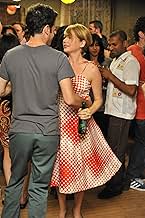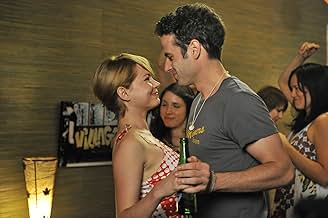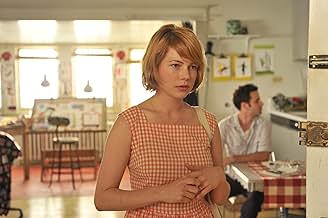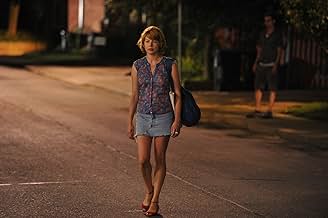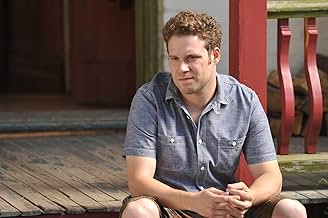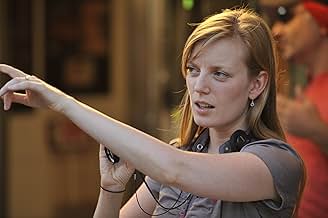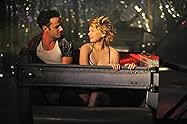VALUTAZIONE IMDb
6,5/10
30.946
LA TUA VALUTAZIONE
Una donna felicemente sposata si innamora dell'artista che vive dall'altra parte della strada.Una donna felicemente sposata si innamora dell'artista che vive dall'altra parte della strada.Una donna felicemente sposata si innamora dell'artista che vive dall'altra parte della strada.
- Regia
- Sceneggiatura
- Star
- Premi
- 3 vittorie e 19 candidature totali
Vanessa Carter
- Tony
- (as Vanessa Coelho)
Ciarán MacGillivray
- Soldier
- (as Ciaran MacGillivray)
Recensioni in evidenza
I watched this film at it's premiere last night and found it quite entertaining and insightful. This was a film about the path that Margot's (Michelle Williams) emotions take as she struggles with the question of fulfilling the parts of her marriage that are missing through infidelity. Michelle gives a very inspiring performance as her character progresses....completely letting the audience in on every facet of her internal struggle and the toll it takes on her. There are times when you empathize and root for her, and times when you shake your head and wonder why she can't see what the audience sees.
Seth Rogen is surprisingly effective in his role as the geeky, but loving husband. I found myself constantly rooting for him. He did a great job of making his character imperfect but likable, but most importantly, believable.
Sarah Silverman delivered nicely in her role, especially near the end of the film. If there was a weak link, it was Luke Kirby, who never seemed to show much emotion at all, in a role where there was such potential for it.
Sarah Polley's writing and directing was excellent, although the pacing was at times a bit erratic. She managed to really capture what life is really like at times, without going over the top. By celebrating the little joys in life, she garnered sympathy for the main characters and the situations that developed, without forcing it. She also showed Toronto off very nicely, which was a bonus.
In all, if you're into character driven films, this is a very good one. The best part of it all, though, is Michelle Williams performance.
Seth Rogen is surprisingly effective in his role as the geeky, but loving husband. I found myself constantly rooting for him. He did a great job of making his character imperfect but likable, but most importantly, believable.
Sarah Silverman delivered nicely in her role, especially near the end of the film. If there was a weak link, it was Luke Kirby, who never seemed to show much emotion at all, in a role where there was such potential for it.
Sarah Polley's writing and directing was excellent, although the pacing was at times a bit erratic. She managed to really capture what life is really like at times, without going over the top. By celebrating the little joys in life, she garnered sympathy for the main characters and the situations that developed, without forcing it. She also showed Toronto off very nicely, which was a bonus.
In all, if you're into character driven films, this is a very good one. The best part of it all, though, is Michelle Williams performance.
One of my favorite things about this charming indie drama was that I really enjoyed was just how real the relationships in the film came across. Writer/director Sarah Polley creates a freshness and realness to this story of a happy young married couple Margo (Michelle Williams) and Lou (Seth Rogen) whose happy life is challenged when Margo meets and falls for neighbor and artist, Daniel (Luke Kirby). Margo thought she had what she wanted but, the free spirited Luke makes here question whether she is really happy with Lou or just thinks she's happy. As Lou becomes focused on writing a cookbook, Margo begins to explore what she really wants... or is it. And that's the thing that I felt was so real about this charming little movie. Margo's answers are never clear as in life they sometimes aren't. Are were really happy or just convincing ourselves to settle for what we have? Is it human nature to always think there is something better for us out there and thus were never are truly content or happy? These are true life questions and questions we ask ourselves as we watch Margo pursue a course which could cost her everything. And, of course there is the age old question, of the grass always appearing greener. I really enjoyed how director Polley gave the film a very refreshing style and really made the characters seem like real people. They all have their little quirks and habits and they make decisions based on emotions and are sometimes selfish and not careful about hurting those around them. And, they don't always know what they really want. The performances are strong across the board with Michelle Williams giving another great characterization of the almost childlike Margo, whose very likable despite her selfish pursuits. Seth Rogen surprises as Lou a man who obviously loves Margo but, has his own goals and is a little too focused on such to notice his wife is troubled. Luke Kirby is good as the artist Daniel who, much like Margo, decides to selfishly pursue their attraction despite knowing she is married. Round out the cast as Lou's sarcastic alcoholic sister, Geraldine is a perfectly cast Sarah Silverman. All in all this is a refreshingly un-Hollywood indie that takes a look at real people with real emotions making real and sometimes selfish and stupid decisions. Something we are all guilty of and that's why we can identify with these people and how love or, what we think is love, can be such a confusing factor in our lives. And, most of all, is there such a thing as true happiness or is it an illusion we create ourselves?
'I'm afraid of being in-between of things.' That's a beautiful line quoted by Margo from a film called 'Take this waltz'. Attracted by the title which reminded me of Leonard Cohen's song which turned out to be the same source at the first place, also the cast especially Michelle Williams that I find quite special, special in a way that her appearance seems to be fragrant because of how she looks like. I somehow believed that the character resembles a lot with her in real life. We all know her divorced co-star husband Heath Ledger died of an overdose accident, and they have a daughter named Mathilda. After his death she somehow emerges into a characterized actress. You can see her playing depressed wife, Marilyn Monroe, and this confused in-house freelance writer not knowing what to write about. It's all very well chosen with her characters. When I see the way she read out the lines, in a naturally performed way, there's a kind of magic and it must be coming from all what she experienced. Of course every actor's acting style comes from their own life and experience. Yet Michelle has this very sincere attitude of not disguising what went through in her spiritually and physically. Her nudity is not difficult to be found. Although a mother to daughter, her figure remains like a maid, pure and simple. It seems like having a child brings her nothing but growth, growth of innocence and courage of showing the real self inside of her.
The film involves a freelance writer Margo who married to a cookbook author and they enjoyed leisure house life on a Portugal region in Toronto, Canada. The couple is happily engaged with their friends and natives. Parties are thrown every now and then. They sometimes argue, but generally leading a sweet and contented marriage till she encounters with a handsome guy at a tourism site. The magic connection drew on these two strangers. They both found each other very strangely familiar. And right at the first conversation they felt natural enough to joke each other and explain one's inner feelings. Together they make a couple of innocent child embarking on an intuitive sight of the world sparkling only in their eyes. It's fun and haunting, especially when it's found they're only neighbors across from street.
Yet the thrill of encounter only keeps in a very cautious way, which makes it all the more alluring. They interact in an extremely explicit and intimate verbal way to displace physical attraction. Imaginary stroking, kissing and intercourse touched their mind with fulfilled excitement. Every morning she followed him or vice versa to the beach, cafés and the swimming pool, where they swim like dolphins, getting near and dodging away. When he attempted to grab her ankle, the moment suddenly halted and she just left like that. She felt like the spell will be broken once the intimacy takes off to a further step. And she's still guarding herself from the fear of casting herself in the craziness of love affair.
The film involves a freelance writer Margo who married to a cookbook author and they enjoyed leisure house life on a Portugal region in Toronto, Canada. The couple is happily engaged with their friends and natives. Parties are thrown every now and then. They sometimes argue, but generally leading a sweet and contented marriage till she encounters with a handsome guy at a tourism site. The magic connection drew on these two strangers. They both found each other very strangely familiar. And right at the first conversation they felt natural enough to joke each other and explain one's inner feelings. Together they make a couple of innocent child embarking on an intuitive sight of the world sparkling only in their eyes. It's fun and haunting, especially when it's found they're only neighbors across from street.
Yet the thrill of encounter only keeps in a very cautious way, which makes it all the more alluring. They interact in an extremely explicit and intimate verbal way to displace physical attraction. Imaginary stroking, kissing and intercourse touched their mind with fulfilled excitement. Every morning she followed him or vice versa to the beach, cafés and the swimming pool, where they swim like dolphins, getting near and dodging away. When he attempted to grab her ankle, the moment suddenly halted and she just left like that. She felt like the spell will be broken once the intimacy takes off to a further step. And she's still guarding herself from the fear of casting herself in the craziness of love affair.
Common terms associated with movies about infidelity would be "lust," "passion" and "betrayal," yet all those things are suspiciously absent from Sarah Polley's infidelity drama, "Take This Waltz." Her film is about as anti-soap opera as you can get — careful to avoid melodrama and dedicated to sidestepping any and all conventional depictions of adult relationships in film.
It seems odd to call Polley bold for showing it like it is, the way that she drags us through the head of her main character, Margot (Michelle Williams), who so undeniably loves her husband, Lou (Seth Rogen), yet cannot deny her feelings for Daniel (Luke Kirby), a man she meets while away for work who turns out to be her neighbor. However, when it comes to filmmaking, anything that deviates from Hollywood reality can make an audience uncomfortable, so it takes some guts to ignore that filmmaking impulse.
Consequently, a good chunk of viewers will be turned off or frustrated by "Take This Waltz," losing patience with the inaction of its characters and pulling their hair out over the tension oozing out of the most casual character interactions. Yes, "Take This Waltz" can be so uneventful that it verges on pointless, but in time Polley's intentions become very clear.
As Margot and Daniel get closer, they don't really get closer, and as Margot and Lou drift apart, they actually come off as in love as they've ever been. For much of the film, it's in Margot's head that the cheating is actually happening. Her thoughts and actions are not in sync and it becomes extremely difficult for us to find empathy for her because we feel as though she needs to act on her feelings, to either voice her displeasure to Lou or throw herself at Daniel. That's the Hollywood impulse calling.
Polley continues to resist, and as challenging as it becomes to watch at times, her film comes out better for sticking to its convictions. As she clearly intended, a switch flips in a scene in which Margot and Daniel ride an indoor Scrambler as "Video Killed the Radio Star" plays, an in the loopy chaos of the scene, we (and Margot) find a certain clarity in understanding what's going on between the main characters.
There's a definite phantasmagoria to Polley's style as well that while visually engaging contrasts a bit with what's otherwise such a nuanced, completely believable film. Several scenes play out like dream sequences, but we later can confirm they actually happened. She seems quite content to toy with our expectations and challenge what we think we know to be true about how love works.
You couldn't cast a better actress than Williams with a performance that's so hard to pull off. We only identify with Margot because we see her humanity, but it's tough to understand her and in some cases even like as a third-party observer of her story. Williams should be lauded for volunteering for this experiment and selling it as well as she does, especially when you consider that Kirby is a total unknown and Rogen is a poster child for modern comedy, for formulaic comedies that are such a far cry from "Take This Waltz."
The end of the movie is bound to bother a lot of people, while others will be intrigued at the choice and make peace with what Polley has to say because she frankly makes a good argument. Fidelity gets such a black-and-white portrayal in film and television, though maybe that's a societal thing because of its prominence in religious code. Nevertheless, she utilizes every tool at her disposal to present the gray area that we so quickly jump to deny and shudder to embrace.
It's tough to really enjoy a film that doesn't emotionally click, in which we don't feel with our hearts that things should've turned out how they did, but Polley has such a beautiful directorial style and conveys her intentions so clearly that "Take This Waltz" warrants a certain degree of respect for its bold yet so honest and impressively perceptive take on love.
~Steven C
Thanks for reading! Visit moviemusereviews.com for more!
It seems odd to call Polley bold for showing it like it is, the way that she drags us through the head of her main character, Margot (Michelle Williams), who so undeniably loves her husband, Lou (Seth Rogen), yet cannot deny her feelings for Daniel (Luke Kirby), a man she meets while away for work who turns out to be her neighbor. However, when it comes to filmmaking, anything that deviates from Hollywood reality can make an audience uncomfortable, so it takes some guts to ignore that filmmaking impulse.
Consequently, a good chunk of viewers will be turned off or frustrated by "Take This Waltz," losing patience with the inaction of its characters and pulling their hair out over the tension oozing out of the most casual character interactions. Yes, "Take This Waltz" can be so uneventful that it verges on pointless, but in time Polley's intentions become very clear.
As Margot and Daniel get closer, they don't really get closer, and as Margot and Lou drift apart, they actually come off as in love as they've ever been. For much of the film, it's in Margot's head that the cheating is actually happening. Her thoughts and actions are not in sync and it becomes extremely difficult for us to find empathy for her because we feel as though she needs to act on her feelings, to either voice her displeasure to Lou or throw herself at Daniel. That's the Hollywood impulse calling.
Polley continues to resist, and as challenging as it becomes to watch at times, her film comes out better for sticking to its convictions. As she clearly intended, a switch flips in a scene in which Margot and Daniel ride an indoor Scrambler as "Video Killed the Radio Star" plays, an in the loopy chaos of the scene, we (and Margot) find a certain clarity in understanding what's going on between the main characters.
There's a definite phantasmagoria to Polley's style as well that while visually engaging contrasts a bit with what's otherwise such a nuanced, completely believable film. Several scenes play out like dream sequences, but we later can confirm they actually happened. She seems quite content to toy with our expectations and challenge what we think we know to be true about how love works.
You couldn't cast a better actress than Williams with a performance that's so hard to pull off. We only identify with Margot because we see her humanity, but it's tough to understand her and in some cases even like as a third-party observer of her story. Williams should be lauded for volunteering for this experiment and selling it as well as she does, especially when you consider that Kirby is a total unknown and Rogen is a poster child for modern comedy, for formulaic comedies that are such a far cry from "Take This Waltz."
The end of the movie is bound to bother a lot of people, while others will be intrigued at the choice and make peace with what Polley has to say because she frankly makes a good argument. Fidelity gets such a black-and-white portrayal in film and television, though maybe that's a societal thing because of its prominence in religious code. Nevertheless, she utilizes every tool at her disposal to present the gray area that we so quickly jump to deny and shudder to embrace.
It's tough to really enjoy a film that doesn't emotionally click, in which we don't feel with our hearts that things should've turned out how they did, but Polley has such a beautiful directorial style and conveys her intentions so clearly that "Take This Waltz" warrants a certain degree of respect for its bold yet so honest and impressively perceptive take on love.
~Steven C
Thanks for reading! Visit moviemusereviews.com for more!
On my first viewing of Take This Waltz, after the film was over, I said in confidence and self assuredness to the people I went to see the film with, that I did not like it. However a strange thing happened. I saw the film and was unable to write my review of it until now and in that delay of time I started thinking of the film more and more and it seemed to resonate and stay with me and there were certain scenes and just whole issues, or ideals that were brought up during the film that I gave second thought to and reconsidered. Having written my review of Take This Waltz, immediately after watching it, I would have probably have given it a rating of 6 out of 10, but as I have thought and pondered over the characters and meaning of the film and just how it makes more sense to me now and in a sense has also grown on me, I now give the film my definitive rating of 8 out of 10. On first viewing there were some things I really liked about the film such as the interesting yet hauntingly beautiful colour contrast to the homes, interiors of the homes and even what the characters wore. It gave the film a distinct look and I admired it for that. I also appreciated that we could have a serious film about people in their 20's with no use whatsoever of cell phones, the internet, or any type of social media devices. It just felt more real having not used those things and avoided being too commercial as well. The one thing that I think really got me about the first viewing of the film was how I really did not like the main character Margot, played by Michelle Williams. I found it very irritating and awkward to the point of being irritating. She didn't seem to know how to act, or behave in certain situations and when she did speak, or try to live her dreams of fantasies it all just felt and looked terribly awkward and clumsy. Take for example her baby talk with her husband, Lou. It seemed so childish and really grated on my nerves. Also the fact that she was so indecisive about everything as well. Also on first viewing I felt that perhaps not all of the characters were as developed as they could have been and overall at the end of the film I think I got what director/writer Sarah Polley was trying to say, but at that point I was not interested anymore and I did not care either. Having thought about the film for a few days I came to realize that Michelle Williams' character Margot, is not as annoying, or irritating as she once seemed and even if she is a little bit, I could now understand why. I think the point was to show a character such as Margot, who is really indecisive about life and the choices that she makes and also shows how insecure and unhappy she is. I think Margot, was really stuck in a situation that became routine and comfortable for her, but she is a restless character always wondering if there is something new and better for her elsewhere. I think Margot's awkwardness as well as nervousness shows because of how insecure and uncomfortable with life and making decisions is hard for her. She wants to do what is right, but not destroy everything she has at the same time. It also lead me to think that I have known women like Margot, and they behaved in a similar such manner as she does in the film and for the exact same reasons that I mentioned above. It is not necessarily a character flaw, but perhaps just a weakness and a stumbling block that one needs to work on. The other characters later on seemed more well developed than on first glance and the film certainly does give a lot of food for thought. I literally spent days afterwards thinking about this film and some of the powerful and heartbreaking images in it. The film is a fairly depressing watch in a lot of ways, but I could respect that about the film because any film dealing with such subject matter, should be serious and take their character's feelings and emotions to heart and all that is here. The film does still have some flaws with it's pacing and there are times where it gets swept up in it's melancholy and it can tend to drag a little bit, but there is still enough rewarding things on display here to be worth a watch, even if you have to think about the film a couple days after you watch it, or even have repeat viewings. Brave viewers should give the film a chance and think about what it says about loneliness, relationships and the myths we sometimes promise ourselves, but ultimately lie to each other and ourselves about. An intelligent and deeply thought out film worthy of an 8 out of 10 rating and not just a 6.
Lo sapevi?
- QuizSarah Polley wrote the role of Lou for Seth Rogen.
- BlooperIn the beginning of the film a day passes by showing the relative movement of the sun - the light moving on the walls. The sun moves from west to east.
- ConnessioniFeatured in Great MoVie Mistakes (2013)
- Colonne sonoreGreen Mountain State
Written & Performed by Corinna Rose & The Rusty Horse Band
Used by permission of Corinna Rose & The Rusty Horse Band (SOCAN)
I più visti
Accedi per valutare e creare un elenco di titoli salvati per ottenere consigli personalizzati
- How long is Take This Waltz?Powered by Alexa
- What is the song playing in the trailer?
- What is the first song in the movie?
Dettagli
- Data di uscita
- Paesi di origine
- Siti ufficiali
- Lingua
- Celebre anche come
- Triste canción de amor
- Luoghi delle riprese
- Louisbourg, Nuova Scozia, Canada(lighthouse)
- Aziende produttrici
- Vedi altri crediti dell’azienda su IMDbPro
Botteghino
- Lordo Stati Uniti e Canada
- 1.239.692 USD
- Fine settimana di apertura Stati Uniti e Canada
- 137.019 USD
- 1 lug 2012
- Lordo in tutto il mondo
- 4.965.950 USD
- Tempo di esecuzione1 ora 56 minuti
- Colore
- Mix di suoni
- Proporzioni
- 1.85 : 1
Contribuisci a questa pagina
Suggerisci una modifica o aggiungi i contenuti mancanti








